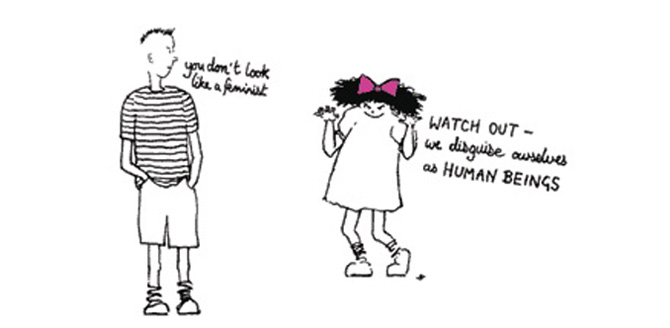 As the mother of a teenage daughter I struggle with her reluctance to call herself a feminist. When questioned on education, equality, women’s rights, abortion, equal pay, women bishops etc etc, she wholeheartedly agrees with everything I say. But when it comes to using the actual word feminist she shows resistance. “Honestly mum, you’re such a feminist” she says with disgust, when I get on my high horse about a particular subject.
As the mother of a teenage daughter I struggle with her reluctance to call herself a feminist. When questioned on education, equality, women’s rights, abortion, equal pay, women bishops etc etc, she wholeheartedly agrees with everything I say. But when it comes to using the actual word feminist she shows resistance. “Honestly mum, you’re such a feminist” she says with disgust, when I get on my high horse about a particular subject.
She’s not alone, her group of bright, sassy friends are all the same. Today’s 16 year olds think they 100% have the right to be whatever they want to be and that feminism is something that concerns their mum’s generation.
Is this because they haven’t got to the age where feminist issues effect them and don’t yet feel its necessary, or is it that they don’t feel the need to be labelled and want to live in an age where women are simply allowed to be women and embrace all that goes with it?
Perhaps the word feminist needs to be re-branded and move on the from the preconceived image of women in dungarees, marching on Greenham Common. Thank God for those women, had I been a generation younger I would probably have joined them and thanks to them and other passionate campaigners and radicals of the 60’s and 70’s, women’s lives changed changed beyond recognition, allowing us equal opportunities, sexual freedom and political and social choices beyond a life devoted to domesticity and marriage and while we realise their significance, I’m not sure the younger generation do.
Books such as the Feminine Mystique, The Female Eunuch and Fat is a Feminist Issue, were essential reading for all self respecting feminists of our age and they changed the way we saw ourselves and our mothers. We grew up vowing we would never turn into the subservient housewives we saw our mothers forced to be. If we had children, we would also have good jobs and have equality in our relationships. We strived and fought to be the generation that had it all and for a while we felt like we did. Then some of us had children and discovered that perhaps this wasn’t always possible, or easy and that having it all, in some cases, meant doing it all and maybe that wasn’t so great after all.
We need feminism just as much as we always did and the younger generation will hopefully, like us, come to realise that in their own time. But perhaps what we do need, is to re-think the term feminist and what it means in the 21st century.
Do we need to be more realistic about the way women live their lives and embrace the things we love as females. Is it ok to read Grazia and call yourself a feminist, can we fight equal pay and love baking, are we shallow and unintelligent to care about fashion? Maybe its no longer ok to dismiss things as irrelevant just because they are seen are overtly feminine. Perhaps its time to celebrate the qualities and interests we have, that make us different to men.
If the younger generation are growing up vowing not to be as confrontational and overtly feminist as we are – maybe we should accept that and move on to find a new ways to fight our battles. Perhaps its time to utilise our female qualities such as empathy and intuition – that make us so good at conflict resolution – to make our point. Perhaps it’s time to stop fighting, judging and bitching between ourselves and embrace the fact that we are all different.
Some of us like make up, some don’t, some care about fashion, other couldn’t care less. If we love baking and craft, so be it, or if carpentry and car mechanics is our thing, that’s fine. Maybe we don’t all want to be CEO’s or politicians and actually enjoy spending time with our children, knitting or shopping with our friends.
What we don’t need is other women making us feel bad about ourselves because of the choices we make. Maybe the new feminism is less about fighting and more about creating a feeling of solidarity and sisterhood, based on the freedom to be a feminist what ever your politics, lifestyle choices or the colour of your lipstick.





Right on, Sister!
Being older has freed me from the tyranny of other peoples approval.
This is kind of what I meant when I commented on yesterday’s “knitting” post, ie. “…we all need to press the fast forward button as far as feminism is concerned”.
And I have to say that I very much agree with your teenage daughter. I share, and always have, her viewpoint that every girl/woman has the right to be and do whatever they want. The difference is possibly that her and her friends don’t have to fight QUITE as hard today as her mother’s generation has had to, they are well-equipped for the battle that remains however.
Change is everything and I do feel that we have to let them call the shots in their lives, without necessarily encouraging them to fight the same battles as ours because they are not the same.
It is of course important that the legacy is laid out for all current and future generations to see, recognise and acknowledge. Without it where would they be?
As an Aussie living in Germany, I find it frustrating that all German women I know (of whatever age) think like your daughter. I am quite open about calling myself a feminist (who as well as loving her career also loves to cook, read fashion mags, wear makeup everyday, have long serious discussions about winter boots with girlfriends), but I don´t personally know one German woman who would call herself a feminist. This is despite the fact that Germany is much more behind the times in terms of woman´s rights than Australia for example.
The concept of feminism here is dominated by one woman, Alice Schwarzer, who has achieved alot for womans rights but also has turned many people away. There seems to be a movement among some younger women here to “reset” the feminist idea, I hope they suceed!
Ha! That’s so funny Mary as I myself am German. A total expat though and complete anglophile so I actually share your sentiment regarding German women – am not offended at generalisation at all but would add that it really depends which part of Germany one is referring to. ;-)
I deal with this in the classroom often, young women, particularly in the first two years of university, who don’t easily identify with feminism — and yes, I think much of that is because they haven’t yet bumped into the issues that galvanize. Also because they get along by getting along, and they can do well at the jobs they’ve found so far, the classes they’ have easy access to, the kinds of activities they’re welcomed in (unlike their feminist forebears).
So I’ve been very heartened to discover the lively campaign begun, I believe, at Duke University, picked up in my country at McGill — Students (and others) hold up a sign they’ve written answering the question Who Needs Feminism? with the formula We Need Feminism Because. . . . . It’s a Tumblr-based campaign worth checking out here: http://www.whoneedsfeminism.com/about.html
How interesting that you posted this today, because one of my favorite bloggers (swistle.blogspot.com) posted today about a book she finished recently that dealt with this topic. Here is a link to an interview with the author which I enjoyed very much: http://thehairpin.com/2012/08/an-interview-with-caitlin-moran
I (a thirty-six-year-old woman) was hesitant to identify myself with feminism in my younger years. However, the older I get, the more I realize that being treated as less-than simply because I am a woman is a bunch of baloney, and I have no tolerance for it. Also, I’m not sure I was as capable of recognizing when I was being treated unfairly when I was younger. I think I needed some life experience under my belt in order to see those situations more clearly.
Quickly I should mention that I haven’t read the book to which I refer, above. My understanding, though, is that it is sexually explicit, so if you are sensitive to that sort of thing, you will want to take note.
I think it’s time to leave the lables behind. Thank god for the courageous women of previous generations but I know who I am & hate any form of lable that makes me feel a bit like a victim. It’s my life & I make my own decisions. Your daughter sounds like she’s doing great.
Have to mention J and A, ever since your run in with the “other one” your posts seem to have extra vigour and purpose -bravo!
Mary, I am somewhat confused by your comment. I too am a German, but completely (like Steffi) Anglophiled. Was it not the Australian Prime Minister that gave that foot Stomping, hands above the head clapping and cheering speech about the misogynogy of Australian men? I think, rather like in the UK, Germany is certainly “up there” when it comes to women’s rights.
But to get back to if one can be a feminist and like to buy scented candles…
We have come on so far in the last 30 years – as a woman in the City, one of 3 amongst 5000 men in the late 70’s, I can tell tales of bullying, belittlement and humiliation that then were everyday, and thank goodness much of that behaviour is over. But I am saddened how little the current generation of young women understand how far they have been able to come because of the previous generations. The current trnd for baking, knitting etc is because of the economic situation not because women are happy with their lot now.
But another aspect of feminism is that “sisterly” behaviour should be practised. The ” other WR ” attitude was offensive to me because they were so dismissive . Since starting my business over 12 years ago all the best advice, encouragement and help have come from other women to whom I am greatly indebted and grateful. I try to pass that karma on.
from another Aussie Mary! I lost interest in “feminism” when Raunch Culture started to nudge into feminism under the guise of “female empowerment”. And when Germaine started to lose it (IMO).
I bought teengirl Caitlin Moran’s “How to be a woman” when she turned 16 and she loved it. Although I’m not 100% with Caitlin (although it did make me laugh out loud in parts) it turned out to be a good way to introduce TG to feminist thinking.
Perhaps it is about standing back a little and allowing this new generation to find their own voice even it is not necessarily the voice we want for them.
It is just a word, that has been given a lot of baggage. Unpack the baggage and it is still meaningful today.